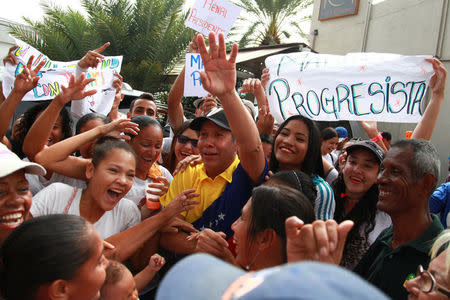Maduro rival seeks to liven lacklustre Venezuela election

By Andrew Cawthorne
MARACAY, Venezuela (Reuters) - Led by a salsa-playing brass band and pumping his arms in the air, Venezuela opposition presidential candidate Henri Falcon plunges into a warren of market stalls.
"Do you want to stick with Maduro?" he asks shoppers, who shout "No!" to the prospect of another six years under socialist President Nicolas Maduro.
"We have an inept president ... If we vote, we win!" Falcon, 56, insists over and over, working the corridors of the market in tatty Maracay city before jumping back in his campaign bus.
With just over a month before Venezuela's May 20 presidential vote, Maduro's main challenger is desperately trying to create a buzz on the street.
Yet with a formidable state apparatus against him, a boycott by former opposition allies, and widespread suspicions the ruling Socialists may rig the vote, numbers are low at Falcon rallies and he faces a daunting task to upset the incumbent.
Around the South American nation of 30 million people, it is hard to imagine a presidential vote is coming.
There is none of the emotional fervour or vast crowds of the 2012 campaign when Hugo Chavez won while dying of cancer, nor of the 2013 race when opposition rival Henrique Capriles nearly caught Maduro.
Instead, despondent Venezuelans are preoccupied with finding food and medicine in a nation beset by scarcities, hyper-inflation and a mass exodus of its youth.
Some polls put Falcon - a former soldier and state governor - in the lead thanks to disgust with Maduro over the economy.
But many Venezuelans believe an autocratic government is not prepared to give up power, especially given lack of reform at the pro-Maduro election board. And the polls also point to widespread abstention, which would hurt Falcon.
"These elections are a farce. They are fixed in advance. Even so, I'm going to vote for that guy - anyone who is against Maduro!" said butcher Antonio Freites, 49, watching Falcon pass in the Maracay market.
Illustrating the factor Falcon hopes will win him votes, Freites said his business shrank 75 percent under Maduro's rule "People want to eat meat but can't pay," he said, holding a kilo of beef worth nearly a monthly minimum wage.
"FRUSTRATION AND RAGE"
At a meeting with young people in Maracay, speaker after speaker tells Falcon how friends have given up and emigrated, and complain they have no prospects of a job to keep them fed and clothed, let alone buy a car or start a family.
Unlike most opposition leaders, who hail from Venezuela's wealthy elite, Falcon's roots are modest: his father a peasant farmer, his mother a teacher. He backed Chavez in the early days, before going over to the opposition in 2010.
While that has led analysts to tout him as a possible "transition" figure in Venezuela, it also bring suspicions from "Chavistas" who say he betrayed them and opposition militants who accuse him of being a Trojan horse.
Addressing gatherings of just several hundred people on his "National Salvation" tour of the nation, Falcon vows to open the state-led economy, protect the poor with cash giveaways, free political prisoners, and rebuild ties with the United States.
"Venezuela doesn't need a Messiah, it needs solutions," he told Reuters, taking a breather on his own in a park. "You can feel the frustration and rage in the streets."
Maduro, 55, has encouraged Falcon's candidacy, fuelling suspicions among pro-boycott opposition supporters that he is a stooge allowed to stand only to legitimize a predetermined win for the ruling party.
The two most popular opposition figures, Leopoldo Lopez and Capriles, are both banned from standing.
Lopez is under house arrest accused of fomenting violence in anti-Maduro demonstrations in 2014, while Capriles is prohibited from holding office on a charge of "administrative irregularities" when he was a state governor. Both men say the accusations were made up to sideline them.
At his own rallies, Maduro has refrained from attacking Falcon with the insults and virulence he applied to Capriles in 2013, though he does accuse him of wanting to sell the nation to foreign powers and eliminate popular state benefits.
Roundly criticized even by "Chavistas", Maduro nevertheless still has a core support of about one fifth of Venezuelans.
"Things are tough, you can't deny it. He has made many mistakes. But I will still be voting for Maduro because he is the legacy of Chavez," said welder Johan Quintero, 47, during a walkabout by Falcon in a poor neighbourhood of Maracay.
Quintero said his family was grateful for subsidized food bags, free healthcare by Cuban medics, and two free laptops for his daughters at school.
Neighbours nodded in agreement as Falcon's entourage went round the corner, a truck blasting out one of his campaign songs by salsa singer Hector Lavoe: "All Things Come To An End".
(Editing by Alexandra Ulmer and Susan Thomas)

